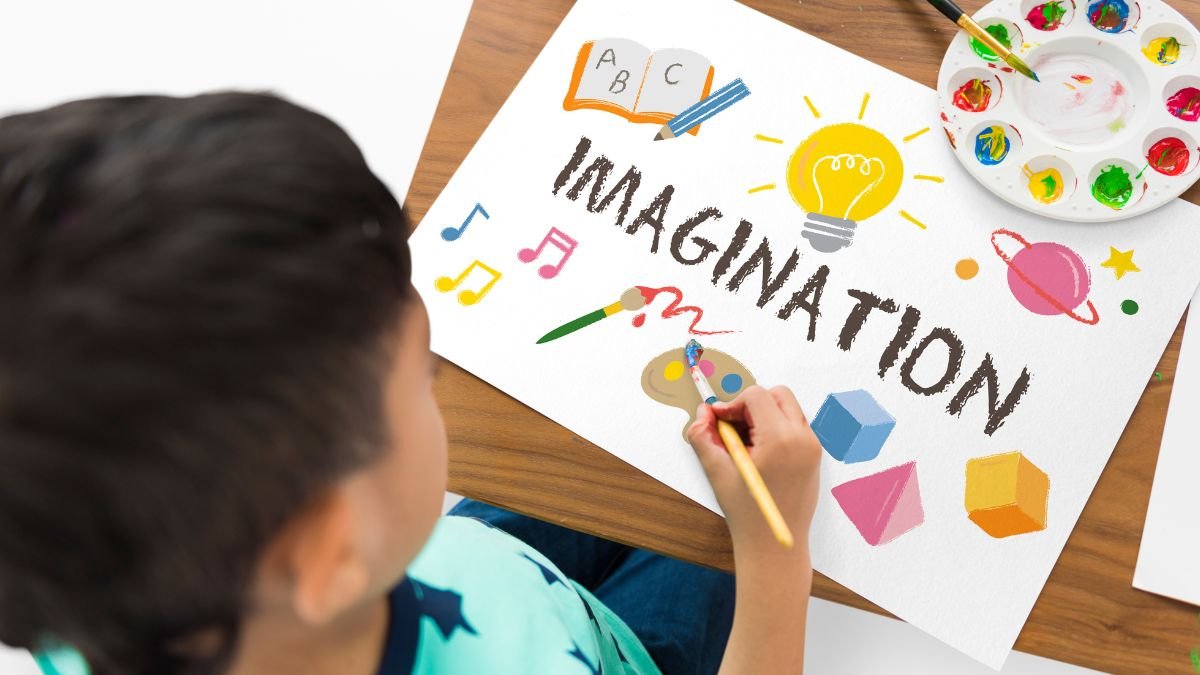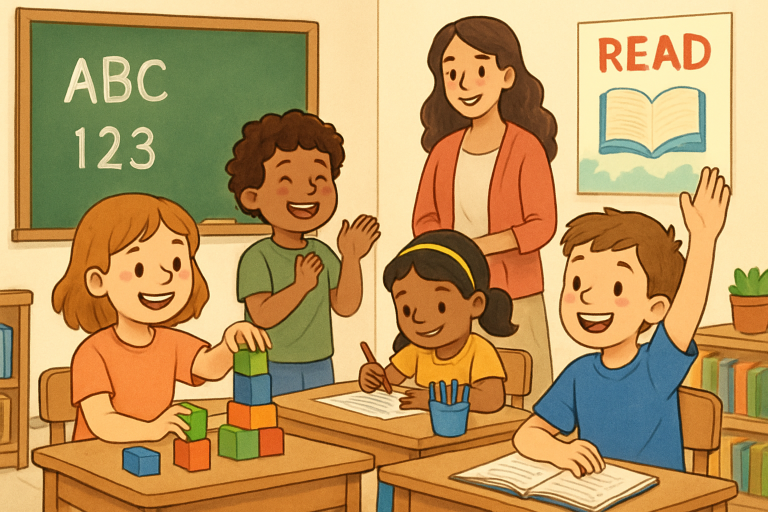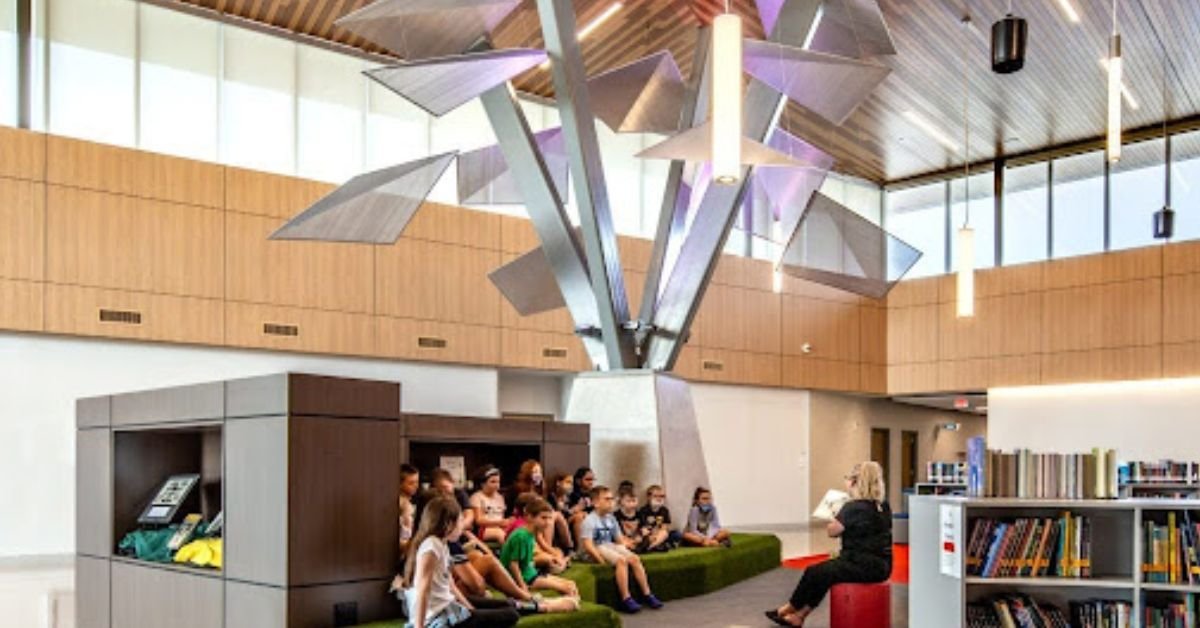Education
Innovative Approaches to Online Educational Leadership

Online educational leadership is transforming with innovative approaches to enhance learning, collaboration, and administration. Leaders must adapt to new technologies, virtual communication, and data-driven decision-making. Tools like artificial intelligence, interactive learning platforms, and cloud-based management systems can create inclusive learning environments. Beyond technology, innovative leadership focuses on student engagement, faculty development, and personalized learning strategies. Virtual mentorship, adaptive learning models, and data analytics help address diverse student needs and improve academic outcomes.
As the digital era rapidly progresses, EdD programs online have become a cornerstone for aspiring leaders keen to turn potential into performance in educational settings. These programs are not just supplementary; they are reshaping the foundation of how educational leadership is taught and perceived. By offering flexibility and accessibility, EdD programs cater to a broad spectrum of learners aiming to enhance their leadership capabilities without disrupting their professional or personal lives. This accessibility allows educators from various geographical and socio-economic backgrounds to engage with higher education and brings diverse perspectives into the learning environment.
Moreover, online educational leadership programs equip individuals with innovative strategies to navigate complex educational landscapes. They are a vital asset for educators looking to make a significant impact, providing them with tools to implement best practices in leadership efficiently across various contexts. As education systems worldwide face unprecedented challenges, the role of qualified and well-prepared leaders becomes ever more critical. Online programs are stepping in to fill the gap by providing high-quality, flexible learning opportunities that prepare educators to meet these challenges head-on.
The Significance of Leadership in Education
In the realm of education, effective leadership is transformational. It turns schools into thriving communities where both students and teachers flourish. At the heart of any successful educational institution is the leader’s vision, which guides improvement in teaching practices and enhances the school culture, creating an environment conducive to lifelong learning. A leader’s work involves managerial tasks and developing a rapport with the community to inspire trust and motivation.
In this respect, educational leadership is about more than maintaining order; it’s about being a catalyst for change. A leader must have administrative skills and the ability to inspire others and foster a collaborative environment. They must create an academic arena where innovative teaching and learning methods thrive, adapting strategies from successful business models and tailoring them to educational needs. Thus, the goal is to lead, mentor, and cultivate future leaders among the faculty and the student body.
Innovative Methods in Online Teaching
The rise of online educational leadership has opened up a plethora of innovative teaching methodologies. Techniques such as gamification and adaptive learning personalize the academic experience, transforming it from a one-size-fits-all model into a tailored journey that meets individual needs. Gamification introduces elements of competition and rewards, making learning captivating and engaging. It taps into the natural human affinity for play and challenges, enhancing motivation and participation in a way traditional methods may not achieve.
On the other hand, adaptive learning uses data-driven approaches to gauge student performance and adjust the curriculum according to individual progress. This foresighted technique ensures that students are neither bored with content they already understand nor overwhelmed by new information. It’s like having a personal tutor for every student, adjusting the learning path based on real-time feedback and performance analytics. These innovations foster a more profound understanding and prepare educators to implement similar adaptive strategies in their leadership roles.
Building Community in Virtual Settings
In pursuing excellence in online education, fostering a sense of community is pivotal. Virtual classrooms may lack the physical presence but can compensate through interactive platforms. Discussion forums, live video sessions, and collaborative projects serve as conduits for connection among students, creating a vibrant online learning community. These interactions help build trust, camaraderie, and a sense of belonging among students, making online learning a solitary journey and a shared collective experience.
Building a community in virtual settings extends beyond academic collaboration; it nurtures soft skills such as communication, teamwork, and empathy. These are crucial for future leaders who must navigate diverse work environments. Moreover, in a world that is becoming increasingly digital, the ability to connect and collaborate virtually is a skill in its own right.
Overcoming Challenges in Online Education
Despite its manifold advantages, online education presents unique challenges, including the digital divide. This divide has become more pronounced recently, exposing disparities in technology access and usage. Solutions such as providing resources for internet connectivity and incorporating user-friendly platforms are essential steps towards bridging these gaps. Offering training for both students and educators in digital literacy is also paramount. This ensures everyone can contribute effectively to the learning process, regardless of their starting point. Equally important is managing virtual sources in real time to support seamless collaboration and immediate feedback. This real-time access enhances engagement and minimizes delays in learning outcomes.
Furthermore, maintaining motivation and discipline in a less structured, self-paced learning environment can be challenging for some students. Innovative solutions such as regular check-ins, online mentorship programs, and progress-tracking tools can help keep students on track. Creating an online atmosphere that mirrors the support and structure of traditional classrooms is vital for cultivating a productive learning space.
The Role of Technology in Shaping Leaders
The intersection of technology and education is pivotal in molding future leaders. Tools like artificial intelligence facilitate personalized learning experiences, enabling educators to tailor instructional material to the specific needs of each student. AI-driven analytics can provide insights that help educators understand learning patterns and adjust methods to optimize engagement and comprehension.
Virtual reality takes it further, offering immersive environments replicating real-world challenges in a controlled setting. This experiential learning can be compelling in leadership training, where scenario-based exercises develop critical skills such as decision-making, strategic thinking, and problem-solving. By leveraging these technologies, educational leaders can lead by example, introducing innovative methods into their curricula and inspiring a new generation of thinkers.
The Future of Online Educational Leadership
Looking ahead, the future of online educational leadership is as promising as it is transformative. The seamless integration of technology into education has set the stage for continuous innovation and evolution. Future educational programs will likely adopt more personalized and competency-based models, ensuring that leaders are well-educated and equipped to apply their knowledge effectively across varied contexts and challenges.
Moreover, as educational strategies become more data-driven, educators can access real-time feedback through comprehensive analytics, enabling timely interventions and customized learning paths. Online educational platforms are poised to become centers of excellence, community building, and collaboration, fostering a global network of leaders dedicated to improvement and equity in the academic sector.
Encouraging Lifelong Learning
In a world where change is the only constant, promoting lifelong learning is not just advisable; it’s essential. Online educational platforms are uniquely positioned to facilitate continuous professional development, encouraging individuals to keep their skills relevant and competitive. By fostering a culture of ongoing education, these platforms not only enhance individual career paths but contribute to the substantial growth of the educational ecosystems within which they operate.
Encouraging lifelong learning means more than offering courses; it’s about creating a mindset where self-improvement is a continual journey. Therefore, online programs must strive to inspire curiosity, provide diverse learning opportunities, and cultivate an environment where questioning, exploration, and perseverance are valued and rewarded.
Education
Creative Ways to Make Moving Easier for College Students

Introduction
Preparing to leave home for college is a significant life event that often comes with a whirlwind of emotions. It’s a time filled with anticipation, uncertainty, and countless to-dos that can feel daunting without the right approach. Moving away for college can feel both thrilling and overwhelming, especially when you consider all the steps involved—from sorting and packing to actually settling into a brand-new environment. For many students, this transition marks their first taste of independence, making it both a milestone and a challenge. Successfully navigating this process requires careful planning, resourcefulness, and a positive attitude. By taking advantage of affordable student moving services early in the process, you can cut down on both stress and expenses while freeing up time to enjoy the start of your new adventure. Smart organizing, space-saving solutions, and the support of friends or family can turn what might seem like an overwhelming task into a memorable and positive experience. With the right preparation, your college move becomes more than a chore—it becomes the first step in a transformative journey. Embrace the changes ahead, knowing each box packed brings you closer to new growth and opportunity.
Start with a Comprehensive Checklist
The moving process begins long before you load up your car or book a van—preparation is the secret to a smooth move. Creating a detailed checklist is key to ensuring you bring everything you need without overpacking or forgetting essentials. Divide your list into categories such as bedding, toiletries, clothing for various weather conditions, electronics, important documents, and academic supplies. Don’t forget to include anything unique to your campus like shower caddies or specialized storage items for your new space.
To keep things manageable, classify your items as “must-haves,” “nice-to-haves,” and “non-essentials.” This way, if you find yourself tight on space, you know what can be left behind. Smaller pre-move tasks like confirming move-in and orientation dates, requesting any necessary paperwork, arranging transportation, and getting in touch with roommates can go a long way to reduce last-minute panic. For students moving long distances, check deadlines for dorm check-ins and off-campus housing lease agreements. Every item you check off provides peace of mind as moving day progresses.
Embrace Space-Saving Packing Techniques
When moving into a typical college dorm or apartment, maximizing every inch of space is crucial for comfort and convenience. While it’s tempting to bring everything, the key lies in smart packing and only bringing what adds value to daily college life. Start with these proven space-saving hacks:
- Roll your clothes: Rather than folding, rolling clothes saves space in suitcases or bins and helps minimize wrinkles. This tactic is a favorite among seasoned movers and travelers alike.
- Use vacuum-sealed bags: Vacuum bags are unbeatable for compressing bulky items like blankets, jackets, and pillows. These bags are convenient for college students in places with wide seasonal temperature changes.
- Opt for stackable storage bins: Clear, stackable bins are a lifesaver for transporting items and organizing your new space. When you can see what’s inside, unpacking is much simpler, and these bins fit easily under beds or in closets.
Group similar items together and label all boxes clearly by room or type so unpacking takes less time. Keep a dedicated bag or bin with “first-night essentials” like toiletries, a change of clothes, basic snacks, and chargers—this makes the first night less stressful and more comfortable. Taking time to pack efficiently now will pay off with an easier move and a less cluttered start at school.
Explore Affordable Moving Options
Moving expenses can mount up faster than you might expect, but there are plenty of student-friendly solutions to keep costs in check. Using your own vehicle or borrowing one from a family member or friend is usually the most cost-effective solution for local moves or minimal belongings. If your haul is more substantial, look into renting a small moving truck or trailer; companies like U-Haul offer flexible options ideal for short-term needs.
Many moving companies specialize in student moves, offering both shipping for boxes and affordable, short-term storage. Services like these are particularly helpful if your campus is out of state or transitioning between summer and fall semesters and can’t take everything home. Don’t forget to compare prices and look for student discounts, as many businesses run college moving specials around move-in season. Consider networking with new classmates to split rental or storage costs, which is often cheaper and more fun.
Engage Friends and Family
While moving can feel like a burden, involving friends and family not only lightens the workload but enhances the entire experience. Invite friends over, put on a great playlist, and share pizza or your favorite take-out—you might even create some inside jokes and memories you’ll cherish for years. This support system transforms what could be a stressful day into a group effort where everyone feels included and needed.
Delegating tasks is also easier when there’s more than one person—assign someone to manage logistics, ask another to deal with electronics and small furniture, and assign your strongest helpers to heavy lifting. The process goes faster, smoother, and provides a perfect opportunity to bond or say goodbye before you leave for school. Returning the favor when friends move is a great way to maintain connections and pay it forward.
Stay Mindful of Safety and Health
- Proper lifting: Always bend at the knees and lift with your legs rather than your back to avoid injuries. Means like dollies or moving straps can make a difficult job manageable—even for heavier objects.
- Hydrate and pace yourself: Particularly during hot weather, make a point to take regular water breaks, eat energy-boosting snacks, and recognize when it’s time to pause. Overexertion is avoidable with planning.
- Wear appropriate clothing: Closed-toed shoes and comfortable, breathable clothing are necessary. Avoid anything that might cause you to trip or restrict movement as you lift and carry.
It’s important not to push through fatigue: take breaks and know your limits. Asking for help with awkward or heavy objects will help prevent injuries and ensure the move remains safe for everyone involved.
Utilize Campus Resources
College move-in days are often carefully coordinated to ease the transition for new students and their families. Many campuses have streamlined the process with the help of orientation leaders, residence hall staff, and student volunteers who assist with unloading vehicles and carrying items into dorms. Some schools offer helpful tools like large rolling carts, designated unloading zones, and temporary storage options for early or overflow arrivals. Understanding what services your specific college provides—typically outlined in pre-arrival emails, welcome packets, or student handbooks—can reduce confusion and make the experience smoother and less overwhelming.
Beyond move-in logistics, orientation events are a valuable introduction to campus life. Attending these programs familiarizes you with key locations such as dining halls, academic buildings, and student service centers. You’ll also learn about resources like tech support, maintenance requests, and where to store additional belongings if needed. Most importantly, orientation helps build community—offering opportunities to meet peers, join student groups, and begin forming lasting friendships and a reliable support system.
Plan for Unpacking and Organization
Arriving at your new dorm or apartment is only the halfway mark; how you unpack and organize will impact your comfort all semester long. Begin with the essentials: unpack bedding, toiletries, and chargers first so that you’re set for your first night. Assign each item a specific spot as you go—this cuts down on clutter and makes it easier to settle in.
- Unpack essentials first: These items will keep you comfortable and connected as you settle in.
- Organize as you go: This approach streamlines the process and helps maximize even the smallest rooms or dorm closets.
- Personalize: A couple of framed family photos, a soft rug, or some string lights can make a new space feel like yours.
Staying on top of organization as you unpack means your space will be set up the way you want it from the start, so you can focus on making friends and getting familiar with campus rather than searching through piles later.
Stay Flexible and Positive
Even with careful preparation, move-in day can still bring unexpected surprises. These hiccups can easily throw things off course, from delayed arrivals to misplaced essentials or sudden changes in plans. However, staying calm and adaptable can make a world of difference. Flexibility is a powerful tool during times of transition, helping you stay grounded while navigating the unpredictable. Rather than fixating on what went wrong, focus on finding quick solutions, keep a sense of humor, and don’t hesitate to lean on others for support. Every moving experience teaches valuable lessons—whether it’s mastering time management, learning how to prioritize, or building resilience under pressure.
To ease the transition, begin the process early and pack intentionally, using checklists and space-saving techniques. Take advantage of available resources, including student services or community support. Most importantly, surround yourself with helpful friends or family. With thoughtful planning and a positive attitude, you’ll not only survive move-in day—you’ll thrive as you step confidently into this exciting new chapter.
Education
Innovative Approaches to Enriching Early Childhood Education

As educational paradigms shift to meet a rapidly changing world, early childhood programs are shaped by research and creative models. Nurturing a child’s curiosity is as important as academic rigor, ensuring engaging, responsive, and meaningful learning. Understanding key components of enriched early education helps parents, educators, and communities make informed choices to support each child’s potential.
The earliest years of a child’s life are critical in shaping the academic, social, and emotional foundation they will build upon for years. During this formative period, searching for exceptional educational experiences becomes essential, leading many families to consider private school enrollment as a pathway toward enriched early childhood learning. Innovative strategies, supportive environments, and collaborative approaches are at the heart of successful early education—paving the way for lifelong curiosity and success.
Why Early Childhood Education Matters
Early childhood education builds the foundation for cognitive, emotional, and social development. High-quality programs prepare children for school and reduce academic struggles later. Structured, nurturing environments enhance language, math, and social-emotional skills, affecting future learning and growth. Beyond academics, such settings boost confidence, resilience, and curiosity, fostering independent thinking and adaptability vital in a changing world. Engaged children become adults who collaborate, innovate, and communicate effectively.
Keys to Engaging Young Learners
Engagement in early learning goes beyond passive facts; it ignites imagination and exploration. Activities like storytelling, play, and practical tasks foster a love of learning. Educators tailor activities to each child’s interests, developing various skills and styles. Success depends on a flexible curriculum encouraging questions, projects, and collaboration. When education feels personal, students see learning as an adventure, not a chore.

Collaborative Learning and Social Skills
Group-based learning activities are powerful tools for building communication, empathy, and teamwork skills from an early age. Students engage in collaborative tasks and learn to listen actively, share ideas, resolve conflicts, and respect different perspectives. Such experiences are crucial for healthy identity development and help lay the foundation for competent social interaction in adulthood.
The Role of Parental Involvement
Parental involvement is crucial for early childhood success, with strong outcomes when families partner with teachers to reinforce learning and create supportive homes. Regular communication builds trust and allows early intervention. Simple acts like reading, playing educational games, and encouraging curiosity support development. When parents show enthusiasm for learning, children tend to develop positive self-esteem and perseverance, according to studies.
Play-Based Learning Strategies
Play is universal for children, fostering problem-solving, decision-making, and emotional skills through activities like imaginative play, building, and arts. An ideal setting balances free and guided play, encouraging discovery, choices, and self-control. Play-based learning builds self-regulation, creativity, and adaptability, while role-playing and cooperative games teach societal roles and empathy. Combining structured and child-initiated play provides a well-rounded early education approach.
Integrating Technology Wisely
In an increasingly digital world, technology can complement traditional learning when used thoughtfully. Interactive games and educational apps capture learners’ attention, reinforce concepts, and foster digital literacy. Quality over quantity is key; digital tools should focus on engagement, problem-solving, and creativity rather than passive screen time. Educators guide children’s tech experiences by choosing age-appropriate apps and modeling responsible digital citizenship. Combining technology with face-to-face activities ensures it enhances understanding without replacing authentic interaction.
Assessing Growth Beyond Grades
Assessment is most effective for young learners when it includes observational notes, portfolios, and self-assessment, providing a comprehensive view of progress across cognitive, social, and emotional areas. Offering constructive feedback builds self-confidence and fosters ownership of growth. This holistic approach helps educators and parents celebrate milestones and address challenges individually, supporting healthy development.
Long-Term Benefits of Early Enrichment
High-quality early education benefits children beyond elementary years, including advanced literacy and numeracy skills, higher graduation rates, improved physical and mental health, and increased lifetime earnings. As society evolves, fostering innovation and adaptability in young citizens is crucial. Investment in early enrichment benefits communities and future generations, creating a cycle of opportunity, achievement, and well-being.
Conclusion
Early childhood education is crucial for lifelong success. It combines academic readiness with social, emotional, and creative development. It equips children with confidence and adaptability to face future challenges. Investment in early years cultivates capable, compassionate, and resilient individuals, shaping healthier societies and stronger economies. Prioritizing education is an investment in a brighter, more equitable.
Education
How Environment Shapes Academic Performance

Academic success at university is influenced by more than just textbooks and lectures; the environments students inhabit play a crucial role in determining how effectively they learn, concentrate, and thrive. From physical surroundings to emotional atmosphere, various environmental factors can either support or hinder academic performance. Understanding these influences is essential, especially for students settling into new accommodation or navigating the demands of independent study.
Physical Environment and Cognitive Function
The physical conditions of a learning space, such as lighting, noise levels, air quality, and temperature, have a direct impact on a student’s ability to concentrate and retain information. Findings from a large-scale study involving over 21,000 students showed that test scores were higher in daylit classrooms, highlighting a clear link between daylight availability and improved human performance.
Similarly, exposure to excessive noise, whether from traffic, roommates, or shared facilities, can significantly impair working memory and reading comprehension. A quiet, well-ventilated space with ergonomic furnishings helps maintain mental clarity, allowing students to focus for longer periods without fatigue.
Design of Study and Living Spaces
The layout and quality of accommodation also influence study habits. Cluttered or cramped environments can increase stress levels and make it harder to focus. On the other hand, a well-organised room with designated zones for sleep, study, and relaxation encourages structure and discipline, both vital for academic consistency.
Modern student accommodation often incorporates shared study lounges, individual workstations, and communal areas that support different learning styles. These spatial cues promote productive behaviours while also providing variety, which can prevent burnout and increase engagement.
Social Environment and Academic Mindset
A student’s immediate social surroundings, including flatmates, peers, and neighbours, can shape attitudes towards learning. Environments that foster collaboration, mutual respect, and shared academic goals often lead to improved study habits and motivation. For example, living in a residence where others prioritise study can create positive pressure, encouraging similar behaviour.
By contrast, environments marked by social tension, distractions, or a lack of community can reduce concentration and increase feelings of isolation, particularly for international students adapting to new cultural norms. The right balance between privacy and community is essential for maintaining focus without sacrificing social support.
Emotional Climate and Psychological Safety
Students are more likely to excel academically when they feel safe, secure, and emotionally supported in their environment. Factors such as feeling at home, the ability to personalise one’s space, and having access to support networks all contribute to a sense of wellbeing, which is foundational to learning.
Stressful environments, including those with poor maintenance, unpredictable disruptions, or limited personal space, can raise cortisol levels and negatively affect memory and information processing. Creating a calming, affirming space helps reduce academic anxiety and supports better cognitive function.
Proximity and Access to Resources
The location of student accommodation affects more than just convenience; it impacts energy levels, time management, and academic participation. Living near campus, libraries, or study hubs can reduce commute-related fatigue and free up hours for coursework and rest.
Reliable access to high-speed internet, printing facilities, quiet zones, and nearby amenities also shapes study outcomes. In cities like Sydney, where travel times can vary widely, having accommodation within easy reach of both educational and everyday essentials, like those available through iglu.com.au, supports a seamless academic lifestyle.
Shaping Success Through the Right Environment
The environment a student lives and studies in is far more than a backdrop; it is a dynamic influence on academic performance. Whether it’s the physical setup of a room, the culture of a shared space, or the emotional tone of a household, every environmental element contributes to how well a student learns, focuses, and achieves. By recognising and prioritising environments that foster concentration, stability, and well-being, students can set themselves up for academic success.
-

 Entertainment8 months ago
Entertainment8 months agoExplore The Kristen Archives: A Treasure Trove Of Stories & More
-

 Business2 years ago
Business2 years agoWhat is O Farming: How to Make Money Online and Its Start-Up Benefits
-

 Law9 months ago
Law9 months agoProtect Your Vehicle with These Smart Motor Insurance Strategies
-

 Entertainment2 years ago
Entertainment2 years agoSandra Orlow: Exploring the Life and Legacy of a Cultural Icon
-

 General1 year ago
General1 year agoBaby Alien Fan Bus: Watch Parts 2 & 3 on Twitter, Reddit!
-

 Technology2 years ago
Technology2 years agoGeekzilla Radio: Your Portal to the Ultimate Geeky Adventure!
-

 General1 year ago
General1 year agoDiana Nyad & Bart Springtime: A Swim to Success
-

 Business2 years ago
Business2 years agoTex9.Net Crypto: Fast, Secure International Money Transfers with Competitive Rates
